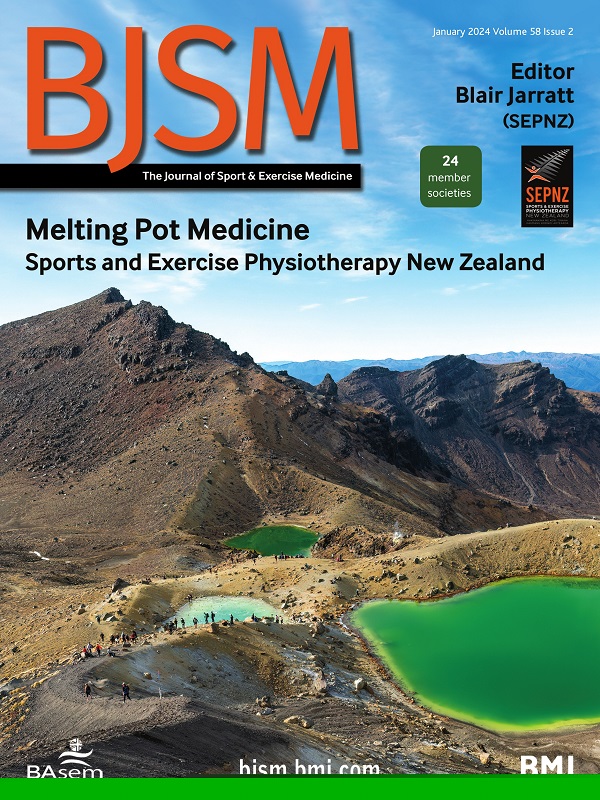运动、二甲双胍及其组合对血糖控制异常者糖代谢的影响:系统综述和网络荟萃分析
IF 11.6
1区 医学
Q1 SPORT SCIENCES
引用次数: 0
摘要
目的 比较运动、二甲双胍及其联合用药对血糖控制异常者糖代谢的疗效。设计 系统综述和网络荟萃分析。数据来源:Embase、Web of Science、PubMed/MEDLINE 和 SPORTDiscus。资格标准 纳入对糖尿病前期或 2 型糖尿病 (T2DM) 患者进行运动、二甲双胍或其联合治疗的随机对照试验。结果包括血红蛋白 A1c (HbA1c)、口服葡萄糖耐量试验中的 2 小时血糖、空腹血糖、空腹胰岛素和胰岛素抵抗稳态模型评估 (HOMA-IR)。结果 共纳入 407 篇文章,410 项随机对照试验(n=33 802)。在糖尿病前期,运动对 HbA1c 水平(平均差 -0.16%,95% CI (-0.23 to -0.09)对 -0.10%,95% CI (-0.21 to 0.02))、2 小时血糖(-0.68 mmol/L,95% CI (-0.97 to -0.39)对 0.01 mmol/L,95% CI (-0. 38 to 0.41)和胰岛素抵抗(HOMA-IR)的疗效高于二甲双胍。38至0.41))和HOMA-IR(-0.54,95% CI(-0.71至-0.36) vs -0.23,95% CI(-0.55至0.10)),而对空腹血糖的疗效相当(-0.26 mmol/L,95% CI(-0.32至-0.19) vs -0.33 mmol/L,95% CI(-0.45至-0.21))。在 T2DM 患者中,二甲双胍对 HbA1c(-0.88%,95% CI(-1.07 至 -0.69) vs -0.48%,95% CI(-0.58 至 -0.38))、2 小时血糖(-2.55 mmol/L,95% CI(-3.24 至 -1.86) vs -0.97 mmol/L,95% CI(-1.52 至 -0.42))和空腹血糖(-1.52 mmol/L,95% CI (-1.73 to -1.31) vs -0.85 mmol/L,95% CI (-0.96 to -0.74));运动+二甲双胍在改善 HbA1c(-1.23%,95% CI (-2.41 to -0.05))和空腹血糖(-2.02 mmol/L,95% CI (-3.31 to -0.74))方面的疗效也优于单独使用每种治疗方法。然而,运动方式和二甲双胍剂量会影响疗效。结论 运动、二甲双胍和它们的组合对改善糖尿病前期和 T2DM 患者的糖代谢都有疗效。对于糖尿病前期患者,运动的疗效似乎优于二甲双胍,但对于 T2DM 患者,二甲双胍的疗效似乎优于运动。PROSPERO 注册号为 CRD42023400622。如有合理要求,可提供数据。如需数据,请联系通讯作者。本文章由计算机程序翻译,如有差异,请以英文原文为准。
Effects of exercise, metformin and their combination on glucose metabolism in individuals with abnormal glycaemic control: a systematic review and network meta-analysis
Objective To compare the efficacy of exercise, metformin and their combination on glucose metabolism in individuals with abnormal glycaemic control. Design Systematic review and network meta-analysis. Data sources Embase, Web of Science, PubMed/MEDLINE and SPORTDiscus. Eligibility criteria Randomised controlled trials involving exercise, metformin or their combined treatments in individuals with prediabetes or type 2 diabetes mellitus (T2DM) were included. Outcomes included haemoglobin A1c (HbA1c), 2-hour glucose during oral glucose tolerance test, fasting glucose, fasting insulin and homeostasis model assessment of insulin resistance (HOMA-IR). Results 407 articles with 410 randomised controlled trials (n=33 802) were included. In prediabetes, the exercise showed greater efficacy than metformin on HbA1c levels (mean difference −0.16%, 95% CI (−0.23 to −0.09) vs −0.10%, 95% CI (−0.21 to 0.02)), 2-hour glucose (−0.68 mmol/L, 95% CI (−0.97 to −0.39) vs 0.01 mmol/L, 95% CI (−0.38 to 0.41)) and HOMA-IR (−0.54, 95% CI (−0.71 to −0.36) vs −0.23, 95% CI (−0.55 to 0.10)), while the efficacy on fasting glucose was comparable (−0.26 mmol/L, 95% CI (−0.32 to −0.19) vs −0.33 mmol/L, 95% CI (−0.45 to −0.21)). In T2DM, metformin was more efficacious than exercise on HbA1c (−0.88%, 95% CI (−1.07 to −0.69) vs −0.48%, 95% CI (−0.58 to −0.38)), 2-hour glucose (−2.55 mmol/L, 95% CI (−3.24 to −1.86) vs −0.97 mmol/L, 95% CI (−1.52 to −0.42)) and fasting glucose (−1.52 mmol/L, 95% CI (−1.73 to −1.31) vs −0.85 mmol/L, 95% CI (−0.96 to −0.74)); exercise+metformin also showed greater efficacy in improving HbA1c (−1.23%, 95% CI (−2.41 to –0.05)) and fasting glucose (−2.02 mmol/L, 95% CI (−3.31 to –0.74)) than each treatment alone. However, the efficacies were modified by exercise modality and metformin dosage. Conclusion Exercise, metformin and their combination are efficacious in improving glucose metabolism in both prediabetes and T2DM. The efficacy of exercise appears to be superior to metformin in prediabetes, but metformin appears to be superior to exercise in patients with T2DM. PROSPERO registration number CRD42023400622. Data are available upon reasonable request. Data are available on reasonable request by contacting the corresponding author.
求助全文
通过发布文献求助,成功后即可免费获取论文全文。
去求助
来源期刊
CiteScore
27.10
自引率
4.90%
发文量
217
审稿时长
3-8 weeks
期刊介绍:
The British Journal of Sports Medicine (BJSM) is a dynamic platform that presents groundbreaking research, thought-provoking reviews, and meaningful discussions on sport and exercise medicine. Our focus encompasses various clinically-relevant aspects such as physiotherapy, physical therapy, and rehabilitation. With an aim to foster innovation, education, and knowledge translation, we strive to bridge the gap between research and practical implementation in the field. Our multi-media approach, including web, print, video, and audio resources, along with our active presence on social media, connects a global community of healthcare professionals dedicated to treating active individuals.

 求助内容:
求助内容: 应助结果提醒方式:
应助结果提醒方式:


